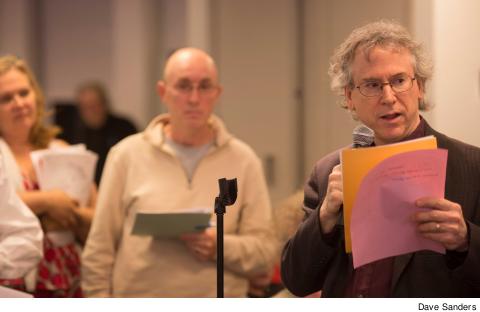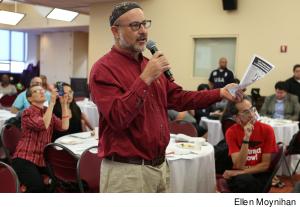State may lift onerous requirements
 |
A PSC-backed reform to New York State’s teacher certification process could help more aspiring educators enter the teaching profession and make the process more fair.
In December, the New York State Education Department proposed eliminating the edTPA (education teacher performance assessment) requirement for teachers. The exam, which is administered by the testing giant Pearson, requires teacher candidates to pay $300 and submit a portfolio of materials on planning, instruction and assessment.
The move to eliminate the exam comes after years of criticism by the PSC state affiliate, New York State United Teachers (NYSUT), saying that edTPA is keeping too many people from becoming teachers at a time when the state needs more educators. PSC leaders agree, noting that the testing process makes it difficult for teacher education faculty to teach and assess student teachers adequately.
MANY OBSTACLES
David Gerwin, PSC chapter chair at Queens College and a professor of education at Queens College and the Graduate Center, noted that edTPA created “all kinds of intractable problems in secondary education” and placed “the certifying and licensing authority in the hands of Pearson, who administered it,” thus stripping “faculty of the autonomy to recommend people for licensure.”
 |
For Gerwin, this type of test has “kept people out of the profession,” especially immigrants for whom English was not their first language. “This is a huge barrier that’s being removed,” Gerwin said, speaking about the reform. “It’s restoring the opportunities to have more meaningful performance assessments.”
The state adopted edTPA as a requirement for teacher certification in 2014. That same year, a coalition of union representatives – from the PSC, NYSUT, and United University Professions (UUP, the union representing SUNY faculty and staff) – was formed and empowered by the New York State Education Department to make recommendations about edTPA.
“We very early on had a united front in questioning the state education department’s adoption of this test,” recalled Steve London, an associate professor of political science at Brooklyn College and the PSC first vice president at the time when the coalition was formed.
TEACHER SHORTAGE
In June 2020, Georgia dropped the edTPA requirement for its teaching certification. Education Week reported “critics [of edTPA] have long worried that it has forced colleges of education to teach to the test and has pushed aspiring teachers – especially those from marginalized backgrounds – out of the profession.”
In other words, critics say, the onus of the test has converted the student teacher process into a cold metrics game, rather than learning a skilled pedagogical craft.
“It is about time to change this unreasonable edTPA requirement during the serious teacher shortage,” said Carol Huang, an assistant professor of education at City College and a former PSC chapter chair. “Recording student teaching sessions for outside reviewers for [a] teaching certificate creates extra barriers for our students at this uncertain time.”
Drew Gitomer, a professor at the Rutgers Graduate School of Education, has been one of the nation’s leading critics of edTPA. He has coauthored several research essays about edTPA and called for a general moratorium on the use of the assessment method.
“Our research suggests that edTPA does not appear to meet the minimum standards of the field of educational assessment,” he told Clarion, adding that “edTPA has been using procedures and statistics that are, at best, woefully inappropriate and, at worst, fabricated to convey the misleading impression that its scores are more reliable and precise than they truly are.”
VIDEO REQUIREMENT
London noted that another common criticism of the exam is that edTPA requires a vast amount of video recordings of student teachers. He points out that private institutions can often provide more technological support to their student teachers than cash-strapped public universities like CUNY. This system, he said, has left student teachers at public institutions at a distinct disadvantage.
K–12 education advocates posit that dropping the edTPA requirement will not only be more fair to student teachers, but it will also address the pressing teacher shortage.
NYSUT Executive Vice President Jolene DiBrango said in a statement, “We’ve heard too many stories about edTPA’s needlessly onerous requirements and costs negatively impacting the student-teaching experience. It’s policies like this that drive people away from the profession before they even get started in their own classroom.” She added that action by the Board of Regents to lift the edTPA requirement would work “toward ensuring the next generation of students will have the high-quality educators they need to be successful.”
But the removal of the edTPA hurdle is not a done deal. Public comment on the proposed amendment is being accepted now through February 28, 2022, and the PSC will submit a letter in support of the proposal to remove the edTPA requirement. Chalkbeat reported that “the earliest the state’s Regents will vote on the proposal is April,” and “if the proposal passes, educator preparation programs must choose or develop a new assessment by September 2023.”
The proposal to lift the edTPA requirement was among other successful efforts to reform teacher certification in New York. Governor Kathy Hochul signed into law two bills reforming the admissions process for graduate-level teacher and educational leader programs. One bill, as it is written, “increases the percentage of students from any incoming class who can be exempted from the admission requirements…from no more than 15% to 50%.” The other, for SUNY education programs, “removes the requirement for a minimum score on the Graduate Records Examination [GRE] or similar examination.”
NEEDED AUTONOMY
Michael Fabricant, a former PSC first vice president and a professor of social work at Hunter College who was one of the PSC representatives in the edTPA coalition, said that all of these developments helped restore the autonomy of teacher education programs.
“This victory will allow faculty to make decisions that no longer privilege a GPA but rather the fuller biography and capacity of applicants,” Fabricant said. “The benefits to students will be significant.”
London believes that the PSC’s role in possibly rolling back the edTPA [requirement] will be a proud milestone in the union’s history.
“We’re an academic union and we stand for quality, and a quality education means having academic freedom,” London said. “It’s also one of the most important anti-racist campaigns we’ve carried out. The edTPA requirement was clearly discriminatory in its application to students of color. To impose a bogus test that screens out students of color from becoming teachers is a racist action.”

